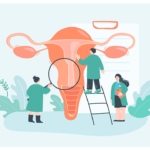5 Myths Vs Facts: Vaginismus

Allo Health is dedicated to personalized well-being, offering support and trusted information tailored to individual health goals. The platform emphasizes human-generated content, led by a distinguished medical team of experts, including physicians and sexual health specialists. Their commitment to credibility involves rigorous fact-checking, authoritative research, and continuous updates to ensure accurate, up-to-date information. Allo Health's unique approach goes beyond conventional platforms, providing expert-led insights and a continuous commitment to excellence, with user feedback playing a crucial role in shaping the platform's authoritative voice.

A Psychotherapist with Clinical specialization, working for over seven years now. Areas of specialization range from Anxiety-related disorders, Mood-related disorders, Personality disorders, Sexual dysfunctions & other mental health issues.
Why This Was Upated?
Our experts continually monitor the health and wellness space, and we update our articles when new information became available.
Updated on 10 June, 2024
- Article was updated as part of our commitment to diversity, equity, and inclusion.

"The following blog article provides general information and insights on various topics. However, it is important to note that the information presented is not intended as professional advice in any specific field or area. The content of this blog is for general educational and informational purposes only.
Book consultation
The content should not be interpreted as endorsement, recommendation, or guarantee of any product, service, or information mentioned. Readers are solely responsible for the decisions and actions they take based on the information provided in this blog. It is essential to exercise individual judgment, critical thinking, and personal responsibility when applying or implementing any information or suggestions discussed in the blog."
You may be familiar with vaginismus, a sexual disorder that affects women and their sexual functioning. Though much more prevalent than most women would realize, vaginismus is rarely discussed. We dispel some unhelpful stereotypes about vaginismus in support of vaginismus awareness to reduce stigma and promote discussion about getting aid and treatment.
What Is Vaginismus?
Vaginismus is the body’s automatic physiological response to the fear of any type of vaginal insertion. When insertion is attempted, the vaginal muscles stiffen uncontrollably due to vaginismus, which prevents vaginal penetration, often affecting the woman’s sexual functioning and psychological well-being. When a woman tries to push anything into her vagina, including tampons, in certain situations, she may feel tight and experience discomfort, or she may feel as though she is “hitting a brick wall,” according to the typical description. Vaginismus is a sexual disorder that makes insertion challenging for some people while affecting sexual functioning for others.
Genito-Pelvic Pain and Penetration Sexual Disorders
The main signs and symptoms of vaginismus would look like pain during penetration attempts. Both vaginismus and dyspareunia are Genito-pelvic pain and penetration sexual disorders. Dyspareunia refers to painful sex. You may have pain before, during, or after sex, and one can experience vaginal, abdominal or pelvic pain.
Although vaginismus might be difficult for those experiencing it, it is treatable. However, because of the stigma associated with it and a lack of sexual knowledge, many choose not to seek help from a medical professional.
What Are The Causes Of Vaginismus?
There is no specific cause identified for vaginismus. Nevertheless, the condition has been associated with;
- one fearing that their vagina was too small for any type of sexual function, insertion or vaginal penetration
- assuming sexual intercourse to be a shameful or wrong activity
- their first-ever sexual experience is a bad one
- an unpleasant memory of a medical examination
- psychological factors like anxiety or having fear associated with pain or pregnancy on having sex.
- Vaginismus, which may result from anxiety disorders, can amplify the feelings of anxiety, which would in turn affect their well-being.
How Does Vaginismus Affect A Person?
Vaginismus is a condition that can cause difficulty in a relationship as well as unconsummated marriages, as this makes it challenging for a couple to develop intimacy and disrupt sexual functioning. It is a condition characterized by involuntary muscle spasms in the vagina, making vaginal penetration extremely painful or impossible.
This can be caused by emotional or psychological factors such as anxiety, fear, or past trauma, but can also be caused by physical conditions such as vulvodynia or vaginal infections. Unconsummated marriages can occur when one partner has vaginismus and is unable to engage in sexual intercourse, leading to poor sexual quality of life.
A few misconceptions due to a lack of sexual knowledge regarding vaginismus discourage the woman and her spouse or partner from getting care. Some of them are as follows –
Myth #1 Vaginismus will disappear if it is not treated.
Fact –This myth discourages women from getting help. Keep in mind that women have no control over spontaneous spasms. Psychological or physiological factors might cause this type of spasm. The only way to not experience pain during penetration attempts is by receiving the appropriate care. So, get treatment and get treated now rather than waiting for things to change. It’s one of the most manageable illnesses of sexual pain. Recurrence is infrequent after treatment.
Myth #2 Women who have vaginismus can never have a good sex life.
Fact – In women who have vaginismus, due to anxiety/fear of penetration, the muscles in the vagina constrict, making it almost impossible to penetrate and/ or causing pain and discomfort around the vagina. However, this does not mean that they can never have pleasurable sexual intercourse or sexual experiences. Therapy (cognitive behavioural therapy or sex therapy and certain exercises/ techniques) is known to have successfully helped several women overcome concerns related to vaginismus and have a good sex life.
Myth #3 Vaginismus is a mental illness.
Fact – No, Vaginismus is not a mental illness. It is a commonly experienced anxiety-induced effect. Your brain sends impulses to your vaginal muscles, which tightens them and results in vaginismus. This reaction is frequently your brain’s way of protecting you from pain; if it thinks that vaginal insertion would hurt you, it will tighten your muscles to prevent it. So even if vaginismus is a psychosexual process, it nonetheless qualifies as an uncontrollable, very real, and very physical condition.
When considering ailments like vaginismus, it is far more logical to think of the mind and body as cooperating as a single system and to approach treatment as such.
A physical anomaly, such as a thick, inflexible, or septate hymen, which causes pain during sexual activity and initiates the vaginismus cycle, is present in most patients. Most of the time, effective penetration is achieved by removing this barrier in combination with Botox injections – all of which is done only after a detailed evaluation and/ or a physical examination by the doctor.
Myth # 4 Vaginismus is a result of sexual abuse.
Fact – Vaginismus can undoubtedly be brought on by sexual assault, although many women do not experience this. Maintaining this misconception is detrimental to those who have not experienced abuse because it may make these women feel irritated, confused, and even ignored. The notion that vaginismus must have a specific trigger is an equally dangerous misconception. Women may engage in sexual intercourse for years without incident before becoming affected.
Myth #5 Vaginismus can never be cured completely.
Fact – Can vaginismus be treated? This is a common question raised by females. Thankfully, the answer is that it can. There are numerous approaches to treating vaginismus. Here are several treatments you can try –
- using psychological treatment
- using physical therapy to treat it
- utilizing vaginal dilators to treat it
Assessment of Vaginismus
Doctors examine the patient’s pelvis to rule out dyspareunia and concentrate on identifying vaginismus based on the symptoms.
After the examination is finished, the doctor makes the patient sit up and look at her genitalia in a mirror. When the patient spreads her labia, either she or the doctor inserts a finger through the hymen into the vagina until she can bear down. The doctor can identify vaginismus using this brief examination.
What Are The Treatment Options For Vaginismus?
The treatment options for vaginismus include topical therapy (use of lidocaine or compounded creams to ease the pain), pelvic floor physical therapy (to relax your pelvic floor muscles), vaginal dilator therapy where tube-shaped devices come in various sizes and this is used to stretch the vagina. These are used so that people with vaginismus can become less sensitive to vaginal penetration. It is usually recommended to first apply a topical numbing cream to the outside of the vagina to make the pain during penetration attempts lesser.
Additionally, cognitive behavioural therapy (CBT) is done to help one understand how their vaginismus can be affected by their thoughts.
- Cognitive behavioural therapy (CBT): CBT helps you understand how your thoughts affect your emotions and behaviours. It’s an effective treatment for anxiety, depression and post-traumatic stress disorder (PTSD).
- Sex therapy: Trained sex therapists work with individuals and couples to help them find pleasure again in their sexual relationships.
How Should One Approach Vaginismus, If Diagnosed?
The first step in treating vaginismus is to consult with a healthcare professional such as a gynaecologist or a sex therapist, to confirm the diagnosis and to rule out any underlying medical conditions. They may also help to identify any psychological or emotional factors that may be contributing to the condition.
It’s important to approach vaginismus with patience and understanding and to remember that treatment can take time and effort. It may also require a multidisciplinary approach, involving a gynaecologist, a sex therapist and a psychologist. It’s also important to remember that seeking help and talking about the condition is not a sign of weakness and that there is hope for recovery.
Sexual health is as important as physical and mental health. In most cases, one consultation can go a long way. Personalized, discreet and judgement-free treatment at your fingertips – book an online consultation with one of Allo’s leading experts.







































